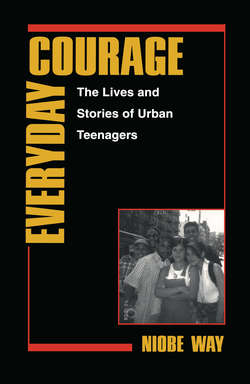Читать книгу Everyday Courage - Niobe Way - Страница 21
На сайте Литреса книга снята с продажи.
But Were They Honest?
ОглавлениеSince I am not able to stand outside of the research relationship, I cannot claim that what the adolescents told us is what they truly feel. However, three of the four interviewers (including myself) had worked as counselors in the school chosen for this study and were thus a familiar, and perhaps more trustworthy, presence to a number of adolescents. A consistent presence and extended relationship with many of the students in the school—although not with those who were interviewed—made it easier for my colleagues and me to engage with the adolescents we interviewed and most likely made it easier for them to relate to us. Our status as both outsiders and insiders, I believe, enhanced the students’ candor and forthrightness. Had we been fully integrated members of this community, we might have been perceived as too risky since we could have spread their stories to others in their community. On the other hand, had we been complete strangers we might have been perceived as untrustworthy. Over several years of interviewing, I came to believe that the adolescents were sincere with us since most of them appeared to speak candidly about many sensitive issues, including their frustrations at home, with their romantic partners, with their teachers, and even with our questions at times. It is also significant, I believe, that we spoke with the adolescents over a period of three years and thus created continuing relationships within which it may have become safer to speak.
The tenets of the interpretive turn have significantly influenced the ways in which I conceive of and conduct this study. They have led me to raise questions about power; challenge, reflect upon, and engage with my own biases, expectations, and prejudices; and reframe the research endeavor as a relational process. These beliefs are firmly integrated into the specifics of my research project to which I will now turn.
